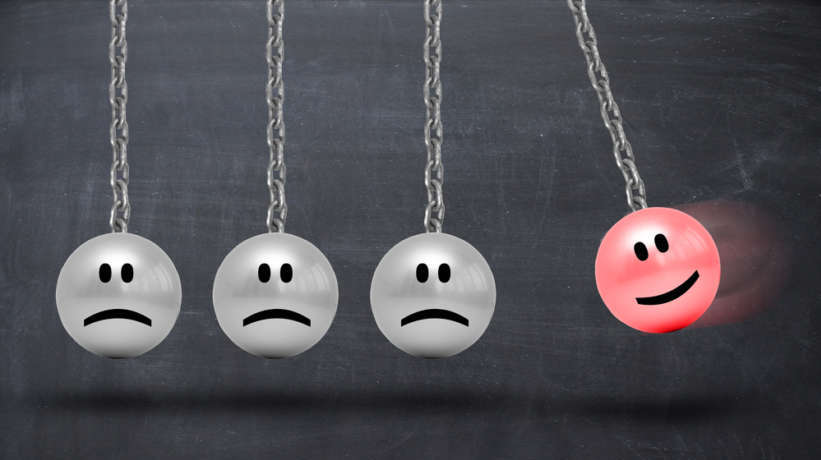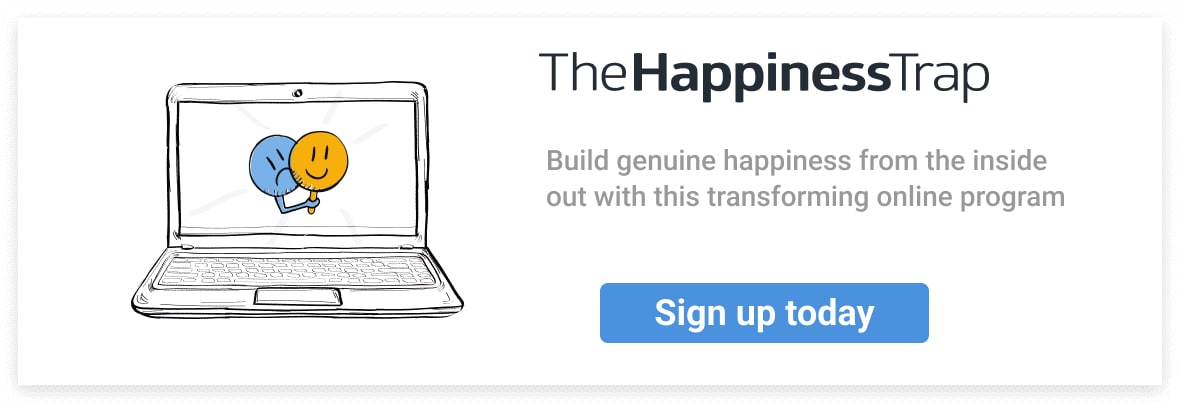Extract from The Happiness Trap, written by Dr. Russ Harris
To answer this question, we need to take a journey back in time. The modern human mind, with its amazing ability to analyse, plan, create and communicate, has largely evolved over the last hundred thousand years, since our species, Homo sapiens, first appeared on the planet.
But our minds did not evolve to make us feel good, so we could tell great jokes, write sonnets and say ‘I love you’.
Our minds evolved to help us survive in a world fraught with danger. Imagine that you’re an early human hunter–gatherer. What are your essential needs in order to survive and reproduce?
There are four of them: food, water, shelter and sex, but none of these things mean much if you’re dead. So the number one priority of the primitive human mind was to look out for anything that might harm you and avoid it!
In essence, the primitive mind was a ‘Don’t get killed’ device, and it proved enormously useful. The better our ancestors became at anticipating and avoiding danger, the longer they lived and the more children they had. With each generation the human mind became increasingly skilled at predicting and avoiding danger.
And now, after a hundred thousand years of evolution, the modern mind is still constantly on the lookout for trouble. It assesses and judges almost everything we encounter: Is this good or bad? Safe or dangerous? Harmful or helpful?
These days, though, it’s not sabre-toothed cats or 200- kilogram wolves that our mind warns us about. Instead it’s losing our job, being rejected, getting a speeding ticket, not being able to pay the bills, embarrassing ourselves in public, upsetting our loved ones, getting cancer, or any of a million and one other common worries.
As a result we spend a lot of time worrying about things that, more often than not, never happen. Another essential for the survival of any early human is to belong to a group. If your clan boots you out, it won’t be long before the wolves find you. So how does the mind protect you from rejection by the group? By comparing you with other members of the clan:
Am I fitting in? Am I doing the right thing? Am I contributing enough? Am I as good as the others? Am I doing anything that might get me rejected?
Sound familiar? Our modern-day minds are continually warning us of rejection and comparing us against the rest of society. No wonder we spend so much energy worrying whether people will like us! No wonder we’re always looking for ways to improve ourselves or putting ourselves down because we don’t ‘measure up’.
A hundred thousand years ago we had only the few members of our immediate clan to compare ourselves with. But these days we can open any newspaper or magazine, switch on any television, tune in to any radio, and instantly find a whole host of people who are smarter, richer, taller, slimmer, sexier, stronger, more powerful, more famous, more successful, or more admired than we are. What’s the fastest way to make a teenage girl depressed?
Show her a fashion magazine. When she compares herself to all those air-brushed, collagen-enhanced, digitally altered supermodels, she is guaranteed to feel inferior or downright unattractive.
And the rest of us are not that different. Thanks to evolution, our minds are now so sophisticated they can even dream up a fantasy of the person we’d like to be — and then compare our ‘real’ self to that impossible standard. What chance have we got? We will always end up feeling not good enough!
Now, for any Stone Age person with ambition, the general rule for success is: the more, the better. The more sophisticated your weapons (and the more of them you have), the more food you can kill. The more plentiful your food stores, the better your chances are for living through times of scarcity. The more substantial your shelter, the safer you are from weather and wild animals.
The more children you have, the better the chance that some of them will survive into adulthood. No surprise then, that our modern mind continually looks for more: more money, more status, more love, more job satisfaction, a newer car, a younger-looking body, a younger-looking partner, a bigger house. And if we succeed, if we actually get more money or a newer car or a better job, then we’re satisfied — for a while. But sooner or later (and usually sooner), we end up wanting more.
Thus, evolution has shaped our minds so that we are almost inevitably destined to suffer psychologically: to compare, evaluateand criticise ourselves; to focus on what we’re lacking; to be dissatisfied with what we have; and to imagine all sorts of frightening scenarios, most of which will never happen.
No wonder humans find it hard to be happy!




